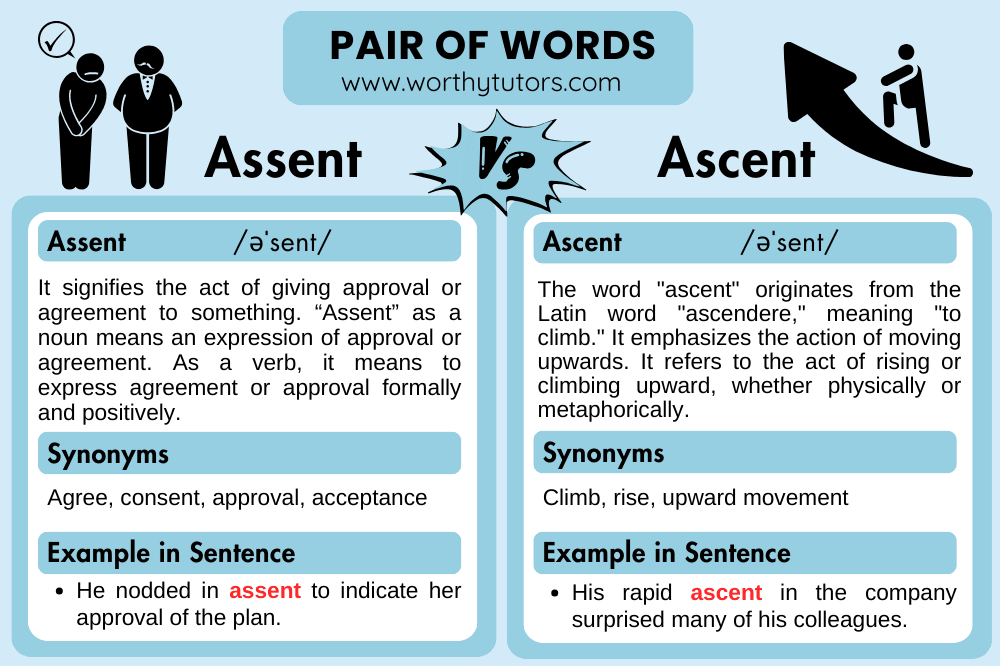
Differences Between “Assent” and “Ascent”
The English language is rich with words that sound similar but have different meanings. Homophones, as they are known, can cause confusion not only for language learners but also for native speakers. Two such words are “assent” and “ascent.” This article will explore these terms in detail, providing clarity on their pronunciation, meanings, usage, and examples.
Assent
Pronunciation of Assent
Assent is pronounced as /Sunday/ (Uh-sent).
Etymology and Explanation of Assent
“Assent” comes from the Latin word “assentire,” meaning “to agree.” It signifies the act of giving approval or agreement to something. “Assent” as a noun means an expression of approval or agreement. As a verb, it means to express agreement or approval formally and positively.
Synonyms of Assent
- Agree
- Consent
- Approval
- Acceptance
Example of Assent in Sentences
- She nodded in assent to indicate her approval of the plan.
- He murmured his assent, signaling his agreement with the decision.
- The committee gave their assent to the new policy.
- She nodded in assent during the meeting to indicate her agreement
- Without his assent, the project could not proceed.
Ascent
Pronunciation of Ascent
Ascent is also pronounced similar as assent: /əˈsent/ (Uh-sent).
Synonyms of Ascent
Climb, rise, upward movement, elevation.
Etymology and Explanation of Ascent
The word “ascent” originates from the Latin word “ascendere,” meaning “to climb.” It emphasizes the action of moving upwards. “Ascent” refers to the act of rising or climbing upward, whether physically or metaphorically. It signifies an upward movement or progression.
Examples of Ascent in Sentences
- The hikers began their ascent of the mountain early in the morning.
- The company’s rapid ascent to success surprised everyone in the industry.
- The ascent to the mountain peak was arduous but rewarding.
- His rapid ascent in the company surprised many of his colleagues.
- The balloon’s ascent into the sky was smooth and steady.
Summary
In conclusion, the exploration of “assent” and “ascent” reveals the beauty of English homophones. Despite sharing identical pronunciations, these words carry distinct meanings and applications. “Assent” encapsulates the concept of agreement and approval, necessary in communication and decision-making processes. On the other hand, “ascent” embodies the literal and figurative rise, symbolizing growth and progress. Through understanding and correctly utilizing such terms, one can enrich their language proficiency and convey ideas with precision and clarity.
Students’ Exercise on “Assent” vs. “Ascent”
- The board members gave their _____ to the new company policy. (Ascent/Assent)
- The hot air balloon made a smooth _____ into the clear blue sky. (Ascent/Assent)
- She nodded her _____ to indicate her approval of the proposal. (Ascent/Assent)
- The team’s rapid _____ to the top of the league standings surprised everyone. (Ascent/Assent)

About Authoress
Mahnoor Jehangir is a seasoned educator and linguist, specializing in English language and literature. With a master’s degree in English and applied linguistics, Mahnoor serves as a subject lead, while also indulging her passion for writing, exploring the nuances of language and storytelling.